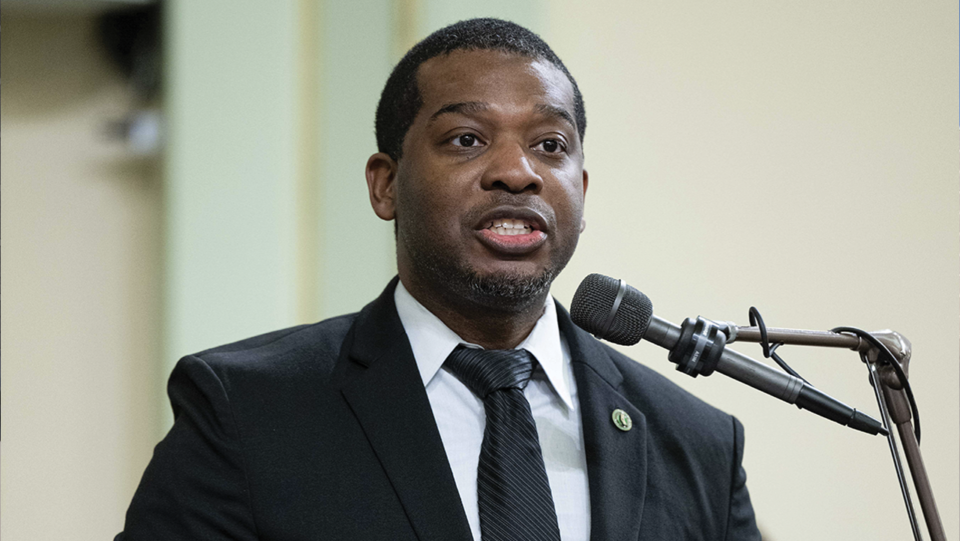“That is a racist, divisive statement from an elected official that puts down another person based on ancestry,” said Bruce Lou.
During a recent meeting of the Assembly’s Committee on Higher Education, an Assemblymember made a remark to a participant that many have interpreted as racially-charged and highly insensitive.
In a video posted to Twitter/X, Bruce Lou stated that during the testimony he was seated “between two hostile Assemblymembers, one of whom implied that I didn’t deserve to participate in the legislative process because of my ancestry.”
The Assemblymember in question is Corey Jackson (D-Riverside), who recently introduced Assembly Bill 7. If passed, AB 7 would allow universities to give preferential treatment to descendants of slavery when accepting admissions. This appears to defy existing protections both at the state and national levels to ensure colleges cannot discriminate on the basis of race or implement affirmative action.
Upon introduction to the Committee on Higher Education, the vote for AB 7 fell on party lines—which is to say that all Democrats voted to advance it while the three outnumbered Republicans failed to reject it. AB 7 will be re-referred to the Assembly’s Judiciary Committee, where it is again likely to be approved strictly on the partisan makeup of the Committee.
Lou states he was there to oppose AB 7 on the grounds that it would “give preferential treatment to the descendants of slaves, and [is] thus a proxy based loophole to the race-blind admissions mandate of Prop 209.” For context, California’s Proposition 209 was a landmark ballot initiative which passed in 1996. The first of its kind, Prop 209 marked the first electoral test of affirmative action policies in the nation and has, in the nearly three decades to follow, endured numerous unsuccessful attempts at both amendment and outright repeal. Among these failures includes Corey Jackson’s own Assembly Constitutional Amendment 7, which was ultimately withdrawn.
“Twice the people of California have made it clear: fairness and merit must guide our public institutions,” Lou stated during his testimony. “These are not abstract ideals. They are the foundation of the American dream—the very dream that brought my parents to this country.”
Assemblymember Jackson, looking directly at Lou seated in front of him, then replied: “Some people who have come to this country in different ways unfortunately believe that they’re on the same standing as us.”
It’s unclear what—from a legal, civil, ethical, or moral perspective—is meant by “same standing” in this instance. One could say the same for the word “us.” Does “us” refer to black and African-American citizens such as Assemblymember Jackson? For all who believe—as our founding documents state—that all people are created equally, and endowed by unalienable Rights, the optics of Jackson’s remark are questionable at best.
We reached out to Lou for his reaction to Assemblymember Jackson’s comment.
“That is a racist, divisive statement from an elected official that puts down another person based on ancestry,” Lou said. “He discredits the immigrant experience of my parents and millions of others.”
Lou, an Chinese-American, describes himself as a “proud son of two immigrants who worked their way to achieve the American Dream.” Perhaps it goes without saying that Chinese immigrants, while never directly used as slaves, faced some of the most intense and vitriolic discrimination of any ethnic group upon their arrival to the United States—from the Chinese Immigration and the Chinese Exclusion Acts to the intense xenophobia of the “Yellow Peril” epidemic in the mid-nineteenth century, which led to Chinese immigrants taking low-paying and highly dangerous jobs in factories, mines, and railroads.
When asked how he thinks this type of rhetoric, which comes from an elected official, influences state politics, Lou responded: “Corey Jackson furthers the divide in this state instead of giving it the unity we need.”
Combing through responses to Lou’s video reveals that public support—at least what can be gleaned from respondents—is overwhelmingly on Lou’s side.
“Not only is this a clear case of racism, but it also shows how the legislature no longer sees themselves as public servants,” comments one user. “They don’t believe in merit, or equal rights, only their crazy intersectionality.”
“So they discriminate against you for fighting against discrimination,” replies another user. “How rich.”
Yet another user calls Assemblymember Jackson’s remarks “shameful” but notes that they are not surprised given how “Harvard and Lowell HS have shown BLATANT discrimination towards Asians…”
“These are the people that are deciding the fate of California,” Lou concludes.


